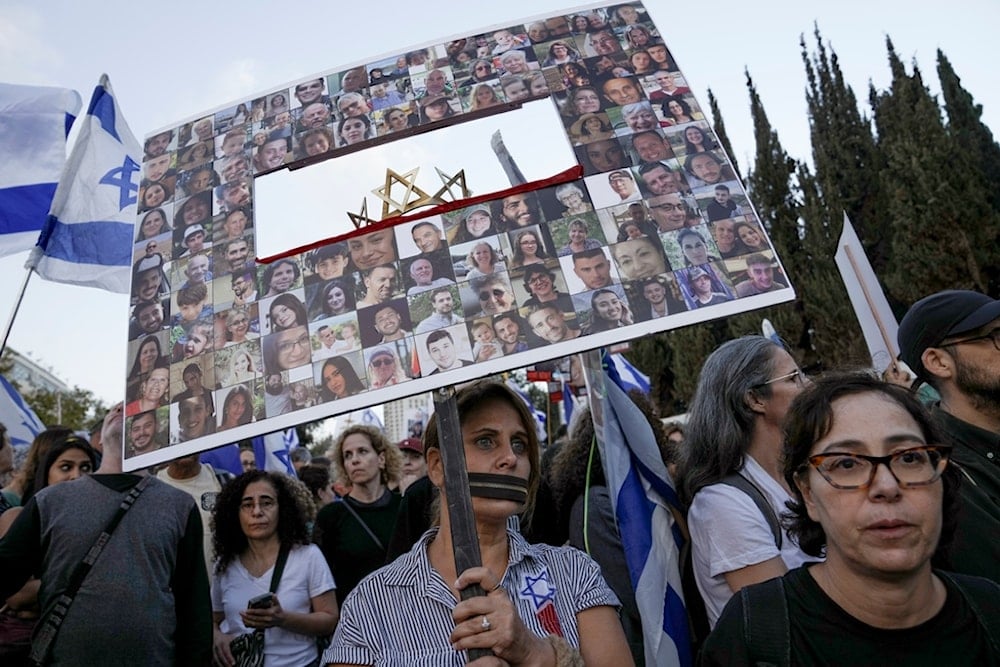Captive release talks 'complex', 'problematic': Israeli general
An Israeli reserve major general says the Israeli occupation is entangled in a war that could go on for years as the fate of Israeli settlers remains unknown.
-

Family and supporters of the captives taken by the Resistance in Gaza complete the final leg of a five-day solidarity rally calling for their return, from "Tel Aviv" to occupied al-Quds, occupied Palestine, November 18, 2023 (AP)
Negotiations regarding Israeli captives taken by the Resistance on October 7 are very "complex" and their situation is "problematic", Israeli occupation forces Deputy Chief of Staff, Reserve Brigadier General Yair Golan, said on Sunday, Israeli media reported.
In an interview for Yedioth Ahronoth's online portal, Ynet, Golan said the Israeli occupation forces in light of their invasion of Gaza were "operating in a difficult entanglement. We need to be open, as the battle with Hamas could last for months and years."
"The goal, without a doubt, is to free all the hostages," he said, emphasizing that "the situation is complex and problematic. They are not only in the hands of Hamas. Perhaps also in the hands of the Islamic Jihad, and maybe with the tribes. These are extremely complex negotiations."
This comes after the United States said Saturday that it was still working to secure a deal between the Israeli occupation and Hamas after a reported tentative agreement to free women and children held captives in Gaza in exchange for a five-day truce.
We have not reached a deal yet, but we continue to work hard to get to a deal. https://t.co/rbSqcqfaKo
— Adrienne Watson (@NSC_Spox) November 19, 2023
"We have not reached a deal yet, but we continue to work hard to get to a deal," White House National Security Council spokeswoman Adrienne Watson said on X, in response to The Washington Post reporting a deal had been agreed.
The Post said a detailed, six-page agreement could mean captive releases begin within days and could also lead to the first sustained pause in the fighting between the Palestinian Resistance and the Israeli occupation forces.
Citing unnamed sources, the newspaper said Israeli occupation forces and the Palestinian Resistance would halt "combat operations" for at least five days while an initial 50 or more captives are released in smaller batches every 24 hours, with overhead surveillance monitoring movement to police the pause.
According to the report, "It was not immediately clear how many of the 239 people believed to be in captivity in Gaza would be released under the deal."
It highlighted that "the stop in fighting is also intended to allow a significant increase in the amount of humanitarian assistance, including fuel, to enter the besieged enclave from Egypt."
The Washington Post cited Arab and other diplomats as saying that "the outline of a deal was put together during weeks of talks in Doha, Qatar among Israel, the United States and Hamas, indirectly represented by Qatari mediators."
"It remained unclear until now that Israel would agree to temporarily pause its offensive in Gaza, provided the conditions were right," the newspaper noted.
It is worth noting that CNN mentioned earlier that one of the sticking points in the negotiations to reach a temporary ceasefire agreement in exchange for the release of Israeli captives is Hamas' demand to stop the flight of Israeli reconnaissance drones over the Gaza Strip. In addition, the sticking points also include the number of days the potential cessation of fighting will last and the number of captives who will be released, CNN reported citing informed sources.
Earlier on Saturday, families and supporters of the 240 Israeli captives rallied in "Tel Aviv" to call on the entity to act immediately on the release of captives, Israeli news agencies reported.
At least 25,000 Israeli settlers participated in the march that kicked off in "Tel Aviv". Protesters marched toward occupied al-Quds where the Israeli Prime Minister's office is located.
Thousands of family members of Israeli captives protested in "Tel Aviv," demanding that Netanyahu's government ensure their release. pic.twitter.com/cvFnIVm6K2
— Al Mayadeen English (@MayadeenEnglish) November 18, 2023

 4 Min Read
4 Min Read








